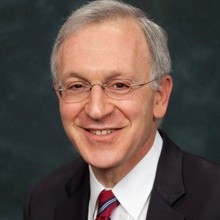Biologics Clinical Research: The Year's Best

By Matthew Pillar, Editor, Bioprocess Online

Harry Selker, M.D. sits down with BioProcess Online for a candid discussion on the Clinical Research Forum’s work, its recognition of advances in clinical and translational research, and why that’s such an important structural element in the bridge between academia and industry.
As distinguished careers go, that of Harry Selker, M.D. is one virtually any academia-minded med student might aspire to. Currently Dean of Tufts Clinical and Translational Science Institute (CTSI) and Chair of the Clinical Research Forum, Dr. Selker’s 35-year run at Tufts started when he came to Tufts Medical Center after completing his training. He earned his M.D. at Brown University, did his residency at Boston City Hospital and was Chief Medical Resident at Boston University Medical Center/University Hospital, and then was a Robert Wood Johnson Clinical Scholarship at UCLA School of Medicine. Soon after joining Tufts, his roles their blossomed into Division Chief of the Division of Clinical Care Research before also becoming Professor of Medicine at Tufts, Executive Director of the Tufts Medical Center Institute for Clinical Research and Health Policy Studies, and Dean of Tufts CTSI.

A key element of achieving that return on investment, says Dr. Selker, is celebrating examples of it working in practice. That’s where his work with the Clinical Research Forum shines. “The Clinical Research Forum has a more than 20-year legacy as the organization for university health system presidents, medical school deans, and other heavy-hitters in academic medicine to push for improvement of clinical research by advancing the field, highlighting successes, and national advocacy in the Administration and Congress,” explains Dr. Selker.
Recognizing The Year’s Top Clinical Research Studies
Among its initiatives, some half-dozen years ago, initiated by the Clinical Research Forum Vice-chair Dr. Herbert Pardes of Columbia University and the New York Presbyterian Hospital, the Forum launched an annual “Top 10” awards program to bring attention to what it deems the year’s most important achievements in clinical research. Hundreds of universities are involved in the research nominated by their peers for the best published work that year, and the Clinical Research Forum Board members judge those nominations on the merits of both their scientific rigor and the potential of their impact on health. “We arduously rank them until we’ve whittled down to the Top 20, and then we really roll up our sleeves and cut them down to the “Top 10,” says Dr. Selker.
While nominees and winners span a host of life sciences disciplines from pharma to medical device and others, several of those in the winner’s circle this year represent important work being done on the biopharma front. Here’s a sampling of those biologics winners:
- In its Convergent antibody responses to SARS-CoV-2 in convalescent individuals, a team at Rockefeller University led by Christian Gaebler, M.D. described the expression of 94 representative antibodies and tested them against SARS-CoV-2 pseudovirus and authentic SARS-CoV-2. A subset of the most potent of these antibodies neutralized authentic SARS-CoV-2 at half maximal inhibitory concentration of less than 5 ng ml−1. Importantly, potent neutralizing antibodies were found in individuals irrespective of their plasma neutralizing activity and thus individuals with modest plasma neutralizing activity have rare IgG memory B cells that produce potent SARS-CoV-2-neutralizing antibodies. The observation suggests that humans are intrinsically capable of generating anti-RBD antibodies that potently neutralize SARS-CoV-2. Thus, vaccines that selectively and efficiently induce antibodies that target the RBD of SARS-CoV-2 may be especially effective.
- In Weill Cornell Medicine’s Genome-wide cell-free DNA mutational integration enables ultra-sensitive cancer monitoring, as published in Nature Medicine, Dan Landau, M.D., Ph.D. and his colleagues replaced the prevailing paradigm of thoroughly examining a few DNA hotspots to assess tumor recurrence with an innovative approach that detects minute amounts of tumor DNA by identifying mutations across the entire genome. The new method, involving the sequencing of all circulating DNA in a patient’s blood sample, represents a “whole genome” approach that boosts the effective sensitivity by one to two orders of magnitude when compared to traditional liquid biopsy approaches.
- Washington University’s Duodenal Microbiota in Stunted Undernourished Children with Enteropathy, authored by Jeffrey Gordon, M.D. and colleagues, established a causal link between the small intestinal microbiota, EED, and stunting in a study of 12-18-month-old Bangladeshi children. When young germ-free mice were colonized with duodenal bacteria cultured from these children, they developed features of EED in their small intestines. The results of the study provide evidence of and identify new microbial therapeutic targets to address childhood malnutrition, recognized globally as the leading cause of death among children under five.
- Anti-Selig-8 Antibody for Eosinophilic Gastritis and Duodeniti, published by University of North Carolina at Chapel Hill’s Evan Dellon, M.D. and colleagues, explored the effect of AK002 (lirentelimab), a humanized, non-fucosylated IgG1, anti-Siglec-8 monoclonal antibody on patients with eosinophilic gastritis (EG) and/or eosinophilic duodenitis (EoD). The antibody interacts with the receptor to cause a rapid depletion of eosinophils in both tissue and blood through antibody-dependent, cell-mediated cytotoxicity and apoptosis. In addition, it inhibits mast cell activation and a mast cell-induced proinflammatory cascade. Eosinophils in the GI tract of the 43 subjects who received AK002 decreased on average by 86%, compared to a 9% increase for the 22 who received placebo.
A full review of these projects, and other recipients of the Forum’s Top 10 Clinical Research Achievement Awards, can be viewed here.
A Once-In-A-Century Shared Honor For Pfizer and Moderna
Among the clinical research projects nominated from publications in 2020 was an outstanding and momentous contribution in clinical research. As the Clinical Research Forum was deep into reviewing nominees last December, Pfizer published the first data on its COVID-19 vaccine. Dr. Selker recalls an emotional state when he saw that first plot showing the outcome differences between individuals who got the vaccine versus those who got placebo. It was a stunning accomplishment that, as the year drew to a close, was matched by Moderna’s release of data demonstrating the efficacy of its own COVID-19 candidate.
“We found ourselves in a peculiar situation,” says Dr. Selker. “We had reviewed all of these fabulous projects, picked the winners, and then we saw these two studies that demonstrated incredible hope for a generational catastrophic problem that could only be solved one way—through clinical research. The whole world was at a standstill, unable to do anything until clinical research came up with a solution. And it did, in amazing fashion and in amazing time. These two vaccines are incredible stories, and they deserve special recognition.”
In an unprecedented departure from its annual approach to the awards, the Forum created and presented Pfizer and Moderna with an honor that Dr. Selker informally dubbed “the every hundred-year award,” so-named because he anticipates the recognition will be bestowed but once per century. The new award is now known formally as the Clinical Research Forum’s “Award for Extraordinary Impact on Health.”
The special recognition also marked a departure from some traditional guardrails established by the awards program early on. “Before this, we've never directly honored a biopharma company,” Dr. Selker explains. “The honor is almost always bestowed on the lead academic investigator for a study, with the nomination typically being proffered by the institution at which the investigator works.” By contrast, the new shared Award for Extraordinary Impact on Health was predicated by Moderna- and Pfizer-authored research published in the New England Journal of Medicine. “Regardless, these two organizations rose up and delivered something incredibly special for humanity,” says Dr. Selker. “So what if they’re companies?”
In accepting the recognition, representatives from Moderna, Pfizer, and the NIH presented at the Clinical Research Forum’s virtual awards ceremony, giving outstanding talks that documented the collaboration that took place under such immense pressure to accelerate the development and production of Coronavirus vaccines. Those acceptance presentations can be viewed here.
“We believe that translational clinical research is critically important to bringing cures for common and rare diseases, and having impact on health, and in this particular year, the clinical research enterprise rose up and hit something way out of the park,” says Dr. Selker. “The Clinical Research Forum, and the entire world, celebrates that immense contribution of clinical research.”
Learn more about the Clinical Research Forum at www.clinicalresearchforum.org
